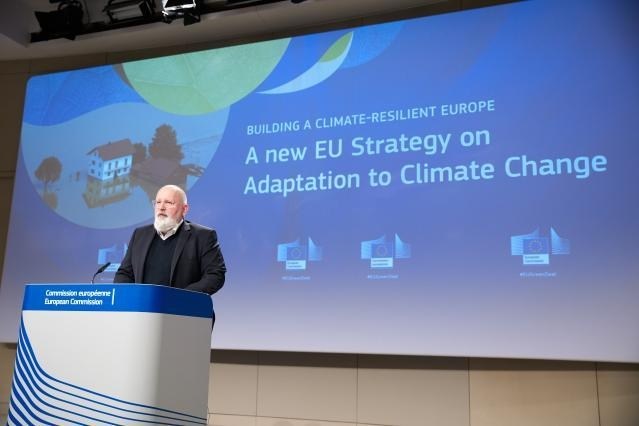The European Commission adopted on Wednesday a new EU strategy on adaptation to climate change, setting out the pathway to prepare for the unavoidable impacts of climate change.
Until now, the world has been trying, not very successfully to prevent, climate change and reduce green-house-gas emissions. Mitigation, that is making climate change less damaging, is also an option. While the EU claims that it does everything within its power to mitigate climate change, domestically and internationally, it now states that EU must get ready to face its unavoidable consequences.
Listing the impacts of climate change, from deadly heatwaves and devastating droughts, to decimated forests and coastlines eroded by rising sea levels, it admits that climate change is already taking its toll in Europe and worldwide. The aim of today's proposals is to shift the focus from understanding the problem to developing solutions, and to move from planning to implementation.
Halting all greenhouse gas emissions would still not prevent the climate impacts that are already occurring, according to the new strategy.
The coronavirus crisis has become an alarm signal to address the social, economic and environmental problems in the world. “The COVID-19 pandemic has been a stark reminder that insufficient preparation can have dire consequences,” Frans Timmermans, Executive Vice-President for the European Green Deal, said at a press conference.

Vice-President Frans Timmermans presenting EU's action plan on climate change, credit: EU
“There is no vaccine against the climate crisis, but we can still fight it and prepare for its unavoidable effects. The impacts of climate change are already felt both inside and outside the EU. The new climate adaptation strategy equips us to speed up and deepen preparations. If we get ready today, we can still build a climate-resilient tomorrow.”
Economic losses from more frequent climate-related extreme weather are increasing. In the EU, these losses alone already average over €12 billion per year. Conservative estimates show that exposing today's EU economy to global warming of 3°C above pre-industrial levels would result in an annual loss of at least €170 billion.
Climate change affects not only the economy, but also the health and well-being of Europeans, who increasingly suffer from heat waves; the deadliest natural disaster of 2019 worldwide was the European heatwave, with 2500 deaths. According to the Commission, EU’s action on climate change adaptation must involve all parts of society and all levels of governance, inside and outside the EU.
“We will work to build a climate resilient society by improving knowledge of climate impacts and adaptation solutions; by stepping up adaptation planning and climate risk assessments; by accelerating adaptation action; and by helping to strengthen climate resilience globally.
On the international arena, the EU promises that it will promote sub-national, national and regional approaches to adaptation, with a specific focus on adaptation in Africa and Small Island Developing States. The EU will also scale up international finance on climate adaptation and work with international partners to close the gap in international climate finance.
However, the new EU strategy does not address EU’s position on criminalising intentional damage to the planet, such as for example the Amazon rainforests, though an international convention against Ecocide. Nor was the issue addressed during Timmerman’s press conference.
In fact, a growing opinion, inside the EU, is calling for the recognition of the crime of Ecocide. With the support of MEPs, an international Ecocide Alliance was created in 2020, facing the destruction of ecosystems, climate change and the mass extinction of biodiversity, against those politicians and companies that threaten the planet.
Major financial institutions located in the EU are very much involved in the deforestation in Amazon and Cerrado in Brazil, according to a recent report published by World Animal Protection.
Financial institutions such as ABN AMRO, Santander and ING Group are bankrolling companies linked to cattle and soya supply chains which are operating in areas of Brazil where rainforests and savannah are being cleared to produce meat and crop-based feed. At least 17% of the beef and 20% of the soy exported from Brazil to the EU may be “contaminated” with illegal deforestation.
Last year EU negotiated a free trade agreement, Mercosur, with Brazil and other South-American countries but the agreement has not yet been ratified by the EU. The critics of the Mercosur are calling on the EU to renegotiate the agreement.
“The EU should not ratify the EU-Mercosur agreement without fundamentally renegotiating its terms,” commented Reineke Hameleers, CEO, Eurogroup for Animals. “As it stands, it is a poor deal for animals, the planet and the people, and it is not in line with the strategies adopted by the EU under the Green Deal.”
M. Apelblat
The Brussels Times

